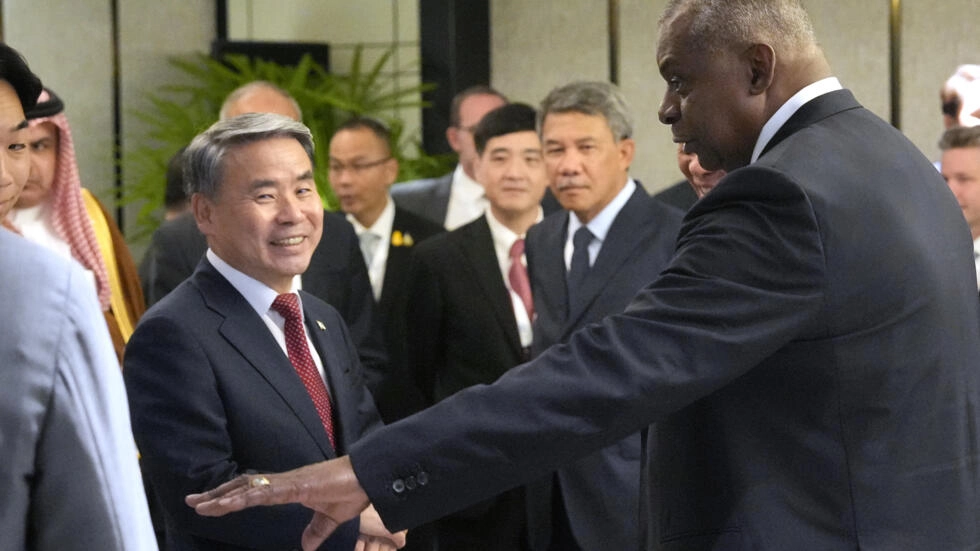China’s defense minister on Sunday (4) criticized the establishment of “NATO-like” military alliances in the Asia-Pacific region, which he said could result in a series of conflicts. Minister Li Shangfu’s statements came a day after dangerous maneuvers of military ships from China and the United States near the Taiwan Strait, an event that angered both powers.
(RFI) Tensions between Beijing and Washington dominated the region’s most important annual Security Conference, held this weekend in Singapore.
“Attempts to encourage (NATO-like) alliances in the Asia-Pacific are a way of hijacking the countries in the region and exaggerating conflict and confrontation,” the Chinese minister said during the meeting, which was also attended by U.S. Defense Secretary Lloyd Austin. This kind of alliance “will only sink the Asia-Pacific into a whirlpool of disputes and conflicts,” Li warned during the event.
The Chinese representative did not mention any country directly, but the speech seemed a reference to the United States, which has strengthened its alliances in the region. The world’s largest power is part of the Aukus alliance, alongside Australia and the United Kingdom. It is also part of the Quad group, with Japan, India and Australia.
“At present, Asia-Pacific needs open and inclusive cooperation, not small coteries,” Li insisted. “We must not forget the great disasters that the two world wars brought to the populations of all countries. And we must not allow such tragic history to be repeated,” he added.
“Increasingly risky activities”
The Pentagon chief and Minister Li shook hands and talked briefly during the opening dinner of the meeting on Friday, but did not have a formal meeting as Washington had requested after the request was rejected by Beijing. However, there are some signs of progress in the dialogue between the two countries.
On Saturday, Austin said that dialogue in the area of Defense between the two powers is “essential” to reduce the risks of conflict. CIA Director William Burns made a secret trip to China last month, a US government source revealed on Friday. In the coming days, the undersecretary of state for Southeast Asia, Daniel Kritenbrink, will also visit the Asian country.
At the same time, however, the armies of the two countries have executed dangerous maneuvers in the two most sensitive areas of the region: the Taiwan Strait and the South China Sea.
Warships from the United States and Canada sailed Saturday through the Strait that separates China from the island of Taiwan. Washington accused a Chinese military ship of maneuvering in a “dangerous manner” near its destroyer Chung-Hoon. Beijing considers the island part of its territory and also claims sovereignty over most of the South China Sea.
“I urge the (Chinese) authorities to take the necessary measures to stop this kind of behavior,” Austin said Sunday in Singapore, in reference to Saturday’s incident. The American also warned that “major accidents can happen.”
“It would be best if all countries, and in particular their planes and warships, do not enter the airspace and territorial waters of other countries,” Li replied.
A few days ago, the US government denounced an “unnecessarily aggressive maneuver” by a Chinese fighter jet in front of one of its surveillance aircraft in the South China Sea.
In Singapore, Pentagon spokesman Pat Ryder criticized the increasingly risky and coercive activities of the People’s Liberation Army in the region, including in recent weeks. A U.S. Defense Department source told the press that “actions speak louder than words.” “The dangerous behavior we have observed from the People’s Liberation Army around the Straits and in the South and East China Seas, and beyond, speak volumes,” he added.
North Korea
Also at the Singapore forum, the United States, Japan and South Korea announced on Saturday that they will share information on North Korean missile launches. The three sides acknowledged in a statement “trilateral efforts to activate a real-time data exchange mechanism aimed at improving each country’s ability to detect and evaluate missiles launched” by North Korea.
The announcement came after North Korea’s failed attempt to launch a spy satellite on Wednesday (31). The device crashed into the sea after a problem with the rocket.
